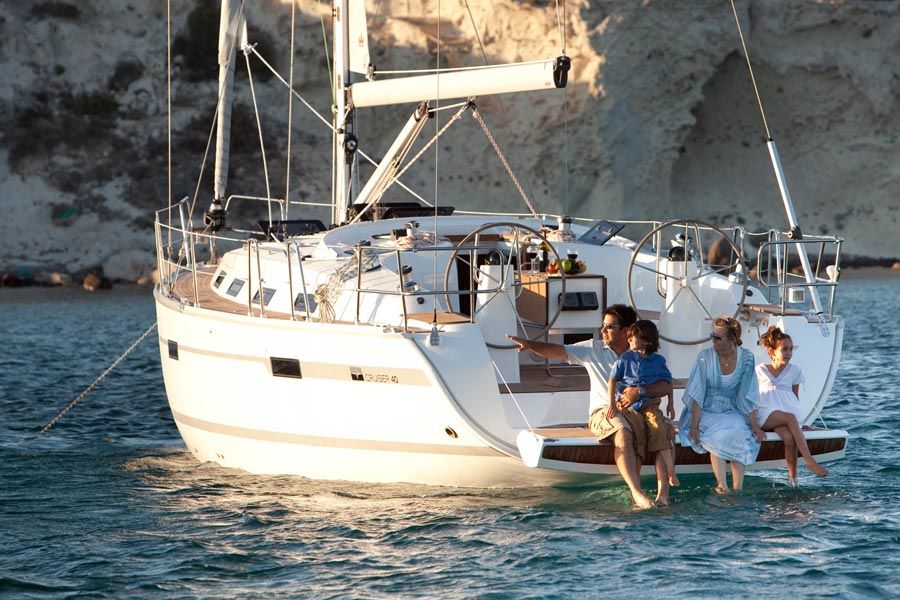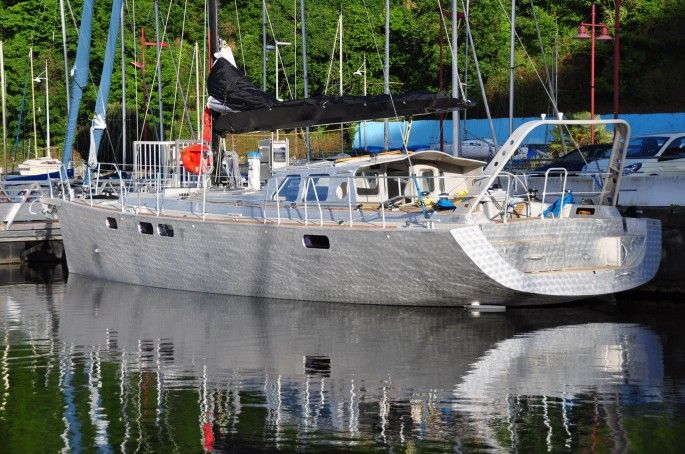Aluminum Vs Fiberglass Sailboat: Which Is Better?
There are various advantages to using both aluminum and fiberglass boats. Nevertheless, if you happen to be caught at a crossroads about choosing the one that suits you better between them, we have got you. To help you make an informed purchase, we made a thorough comparison of both aluminum and fiberglass boats’ pros and cons. Our examination of the aluminum and fiberglass boats is based on a few criteria. They include the following: Density, aesthetics, durability/ruggedness, corrosion, stability, comfort, noise, price, and repair/maintenance.
Here Are Some Pros and Cons Between Aluminum and Fiberglass Sailboats
Density
One of the most basic characteristics of aluminum is that it is a very low-density metal. Its density is about one-third of steel’s. This tells a lot about how an aluminum boat will fare at sea.
Fiberglass, on the other hand, is the result of reinforcing plastic such as thermoset polymer matrix or polyester resin with glass fiber strands. Generally, fiberglass is much denser than most metals. More so, the density of fiberglass can even be higher depending on the type of glass fiber used in its production. Although it is pretty heavy as a result of its density, fiberglass breaks easily in comparison to metals like aluminum.
Aesthetics
Many boat aficionados place this criterion at the top of their list because it is very important to them, perhaps even the reason they started sailing.
Fiberglass boats are generally better looking than aluminum boats. With clean hulls polished with Gelcoat, the average fiberglass boat would give any aluminum boat a beating in the looks department. The woodwork of fiberglass boats can also be very alluring.
In addition, fiberglass possesses a relatively high tensile strength; hence, it can easily be molded into any shape. This is also advantageous in relation to style and aesthetics.
Durability and Ruggedness
One thing that aluminum boats do well is take a hit. Due to the metallic strength of aluminum, aluminum boats react better to heavy impact than their fiberglass counterparts. In cases where fiberglass boats will sustain serious damage such as a crack, aluminum boats might make a minor dent.
As a result of this toughness, aluminum boats last for a very long time; many boats made of aluminum last as long as their owners. Therefore, if you want a rugged, tough, durable boat, we suggest that you look no further than an aluminum boat.
Corrosion (Electrolysis)
One problem that is faced by many aluminum boat owners is electrolysis. Electrolysis is a process that is brought about by the passing of direct electric current through an electrolyte, thereby producing chemical reactions at the electrodes and resulting in the decomposition of materials. Parts of a boat can easily decompose when it is exposed to electricity. Simple metal objects such as hooks finding their way to the bilge of a boat can cause this problem.
Nevertheless, fiberglass boats cannot suffer from electrolysis. If you want to completely avoid the problem of electrolysis, going for a fiberglass boat is expedient.
Looks
Let’s face it. As a general rule, fiberglass sailboats look much better than aluminum ones. At least, that used to be the case about a decade ago. However, nowadays, many boatbuilders have produced some stunning aluminum sailboats that look spectacularly like spaceships. You just can’t take your eyes off of them.
Stability
In relation to this criterion, fiberglass boats are better. They are heavier; therefore, they give a better feeling of stability and control while at sea. It is unlikely that while at sea, a fiberglass boat will be recklessly pushed and tossed by waves.

Comfort
Many boaters will give a lot to find a comfortable vessel. Like stability, comfort can be directly proportional to the weight of the boat. So, fiberglass boats win once again. Nobody likes a bumpy ride. Every car driver wants smooth, tarred roads that are easy to navigate. In the same way, no boater likes being tossed around in their boat, especially if the boat is being used for pleasure. Due to the density of the material they are made of, fiberglass boats prevent this better than aluminum.
Another reason why fiberglass boats are more comfortable is that fiberglass can be molded and stretch into many different shapes and sizes. Therefore, you are more likely to find features that are made for luxury and comfort in fiberglass boats. If you are looking to purchase a sailboat mainly for pleasure, then a fiberglass one might just be the best for you.
Climate
Aluminum is much more prone to moisture because the material transfers heat much faster than fiberglass. As a result, aluminum boats are usually colder and much more difficult to heat, a disadvantage when used for cold weather sailing or as a liveaboard sailboat.
Osmosis
This is a significant disadvantage of fiberglass sailboats. Osmosis happens when air bubbles are left inside the fiberglass hull at the time of construction during the lamination process. These air bubbles fill with water, and this process goes on indefinitely. As a result, these bubbles grow and multiply, causing the hull to weaken. With an aluminum sailboat, you do not have to worry about osmosis since it is only developed on fiberglass sailboats.
Noise
Aluminum boats can be very noisy when traveling at high speeds. This is because the water tends to hit the hull rather violently. If you want to have a swell time on the water with friends and family or alone with your thoughts, a fiberglass boat is a better option.
Price
Fiberglass boats are more expensive than their aluminum counterparts of similar specifications and features. Nevertheless, this is not a rule, not to talk of an indisputable one. As far as boats go, the cost depends fundamentally on the features and specifications. Aluminum boats being more expensive than fiberglass boats is mainly caused by other factors such as the cost of production, and not because one type is inherently better than the other.
Depreciation and Resale Value
Aluminum is stronger than fiberglass and more environmentally friendly. This makes well-maintained aluminum sailboats depreciate less and hold their value better than their fiberglass counterparts. Also, because aluminum sailboats do not deteriorate over time and require less maintenance over their life span, they last longer; which leads me to my next point:
Longevity
Aluminum is a stronger material than fiberglass, offers better corrosion-resistant, and is simpler to maintain. For that reason, sailboats made from aluminum can last longer than fiberglass ones; generally around 20% longer. This is a somewhat futile and theoretical argument because you can find 60-year-old seaworthy fiberglass sailboats on the used market today that are still going strong.
UV Exposure
Unlike fiberglass, aluminum remains unaffected by the sun’s harmful UV lights. Just like our skin, the gelcoat of a fiberglass sailboat will fade and oxidize from the sun, unline aluminum. Overall, an aluminum sailboat hull exposed to UV rays will fare much better than fiberglass with the same level of care. Overexposing fiberglass to the sun, which is easy to do, by the way, can degrade the gelcoat and make it look old, dull, and faded. Not a look that you want on your precious sailboat.
Repair and Maintenance of Aluminum and Fiberglass Sailboats
Fiberglass boats can be difficult to repair. As already mentioned in “Stability and Ruggedness,” they are also much more likely to get damaged. Usually, aluminum boats hardly suffer other forms of damage apart from a simple dent. Simple tools such as a hammer can be used to solve this problem. Impacts that would cause a dent in aluminum boats might cause a hole in fiberglass boats. Also, most fiberglass damages cannot be fixed within a short period of time, unlike aluminum boats. If you love being at sea very regularly, this will be a problem for you. Also, the repair of fiberglass boats usually requires the help of a professional. This brings us to the cost of maintenance and repair.
The cost of maintaining and repairing fiberglass boats is high in comparison to their aluminum counterparts. Gelcoat begins to fade soon. In order to preserve its beauty, the owner of a fiberglass boat is required to wax and polish regularly. If this is not done timely, it will become more difficult to clean because more dirt will accumulate on the surface. Apart from the time required for this, financial resources are also involved.
Furthermore, in relation to maintenance and repair costs, slight damage to a fiberglass boat may require a complete change of hardware. For instance, water entering the center core of a fiberglass boat will result in rot from the interior. And there are many other delicate areas like this that may result in extra expenses.
In addition, there are other maintenance areas, such as fuel efficiency, where aluminum wins again. Aluminum boats are also way easier to tow. Tow fees are lower if you opt for an aluminum boat instead of a fiberglass one. As far as engine size goes, you can fix smaller engines into aluminum boats and travel at a higher speed.
Plate Aluminum Boats – What is Plate Aluminum?
Plate aluminum or plate alloy is usually about 0.16 – 0.24 inches and thicker. Aluminum boat manufacturers nowadays use plate aluminum in place of ordinary aluminum. It is heavier than regular aluminum, so it has some of the advantages of the fiberglass boat, such as smooth ride and stability. Plate alloy, however, does not possess the ability of fiberglass boats to be molded into different shapes and styles.
Aluminum Vs. Fiberglass Sailboat – Summary
We cannot outrightly or rightly say that an aluminum or fiberglass boat is better than the other. Eventually, it all comes down to the preferences and needs of the user. When all the characteristics, advantages, and disadvantages are considered, it is left to the future boat owner/user to choose which boat best suits him.
Functionality is also a very important factor here. To help you choose between an aluminum and a fiberglass sailboat, make sure to incorporate the specific/main purpose for buying the boat into the decision making process before making the purchase.
However, for most people, fiberglass sailboats are better and more suitable for general use than aluminum sailboats.
